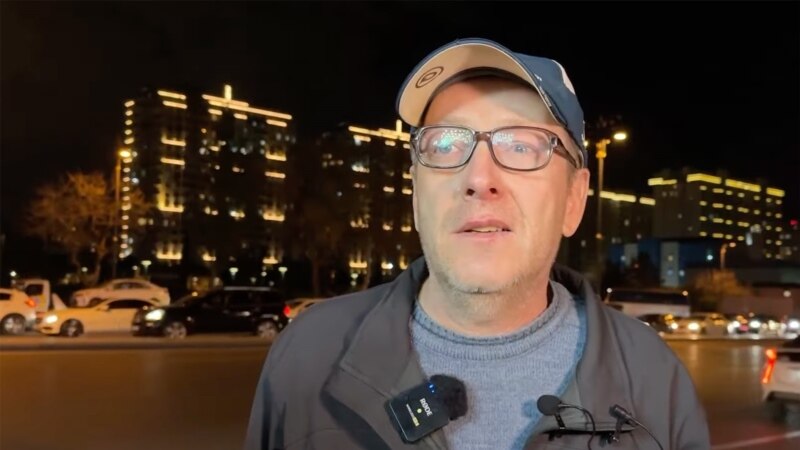
Efforts to free investigative journalist Hafiz Babali from prison in Azerbaijan failed last week when the Baku Court of Appeal denied a motion to release him to house arrest.
Babali, an editor at the independent Turan News Agency, was detained on December 13 on charges of “smuggling foreign currency” and ordered to be held in pretrial detention for three months.
His lawyer, Rasul Jafarov, told VOA that Babali denies the accusations and believes the case against him is related to his investigative journalism. Babali is editor of Turan’s economy section.
Since late 2023, accusations of smuggling foreign currency have been leveled against five other journalists, all of whom work at Abzas Media, an outlet that focuses on corruption.
If convicted, they could face up to eight years in prison. The journalists deny the accusations and link their persecution to investigations into suspected corruption among high-ranking officials in Azerbaijan.
The arrests came amid a spike in media detentions, with at least 10 journalists detained since November.
Some journalists and human rights defenders have noted the timing of the arrests, with a snap presidential election due to be held February.
Aynur Elgunesh, editor-in-chief of Meydan TV, says the arrests took focus away from other issues, which benefited the government.
“We began to focus a little more on ourselves, and arrests and agitations inevitably led to other issues being pushed back,” she told VOA.
Bahruz Maharramov, a member of the Azerbaijani parliament, told VOA he did not agree with the claim that the legal cases are related to media activity.
“There are specific legal facts about any citizen against whom criminal prosecution has been initiated. Work is being done in this direction,” he said.
One of the detainees, Elnara Gasimova, spoke with VOA shortly before being called in for questioning a second time.
Gasimova, who also works for Abzas Media, said she expected to be detained on bogus charges.
“I do not accept the accusations related to the Abzas Media case, neither on my behalf nor on behalf of others, because we are journalists and are subjected to this treatment solely because of our professional activities,” she said.
Authorities later detained Gasimova on January 13 and ordered her held in pretrial detention for 2 1/2 months on charges of “group smuggling.”
Elgunesh told VOA that Abzas Media was trying to convey real information to the audience about owners of investments, the companies involved, and that few tenders — invitations to bid on a project — are held in the country.
“At the same time, Abzas Media questioned the wealth of people represented in the highest level of power. Thus, it became a threat to the government. They saw that the law they drafted had little effect on independent journalists,” said Elgunesh, referring to a 2022 media law.
Enacted by President Ilham Aliyev in January 2022, the media law was condemned by media groups, international organizations and the Venice Commission, a Council of Europe body that advises on constitutional matters.
Human rights defender Anar Mammadli told VOA that freedom of media and expression have always been under government pressure.
“Azerbaijani authorities, demonstrating political intolerance, are conducting a policy of pressure against those with different opinions, including critical journalists, media organizations and social media users. The main purpose of this is to prevent different, alternative opinions in the country,” he said.
Mammadli said the arrests of so many journalists in recent weeks is an indicator of the government’s intolerant attitude toward freedom of expression. To prevent this, he said, the government must show tolerance for criticism.
“It should not be afraid of criticism. It must demonstrate political will. Unfortunately, this does not exist,” he said.
Elgunesh says international organizations are paying attention to the human rights situation in Azerbaijan.
“We saw from the PACE session that the issue of human rights is on the agenda. I hope that external pressure will continue. In Azerbaijan, the government will not be able to narrow the boundaries of freedom of speech as much as it wants,” she said.
PACE is the Parliamentary Assembly of the Council of Europe.
In a statement to VOA, the European Union foreign policy and security affairs press office said freedom of expression and independent media are universal values.
“The human rights situation in Azerbaijan, and the situation of independent media in particular, remain an issue of concern that we repeatedly raise with our Azerbaijani counterparts,” said the statement, attributed to spokesperson Peter Stano.
“We use every opportunity to call on Azerbaijan to uphold its domestic and international obligations regarding freedom of media and human rights of its own citizens.”
Azerbaijan is ranked 151 among 180 countries on the World Press Freedom Index where 1 shows the best media environment.
Maharramov, the parliamentarian, told VOA he does need believe the annual index compiled by Reporters Without Borders is objective.
“We do not consider this kind of prejudice acceptable,” he said.
Babali’s lawyer says the efforts to secure his client’s release or move to house arrest will continue.
“If there is a desire or request from him, relevant complaints will be sent to the European Court of Human Rights,” Jafarov said.
